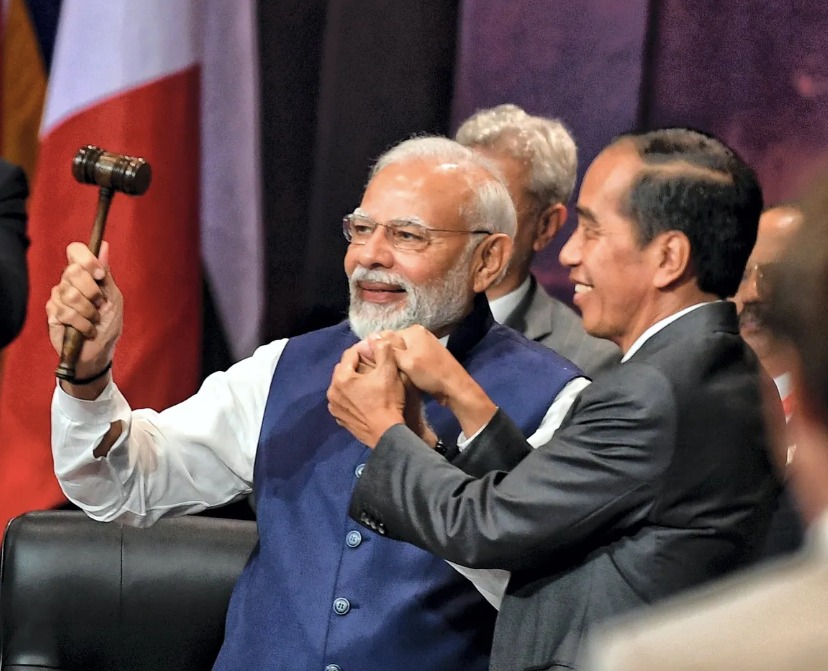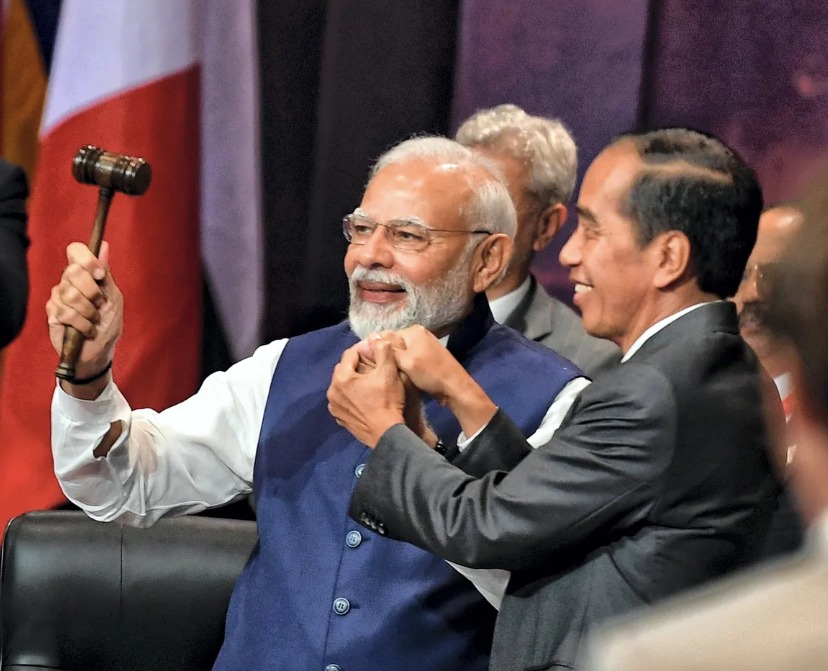
PM Modi at G20 in Bali, Indonesia
Prachi Mishra / New Delhi
Indian Prime Minister, Narendra Modi, in his speech at the first working session on Food and Energy Security of the G20 Summit in Bali, called for all the world leaders to strive for peace, security, and harmony. Deriving from the lessons learnt during the wars of yesteryears, he urged for a path to ceasefire and diplomacy in conflict-ridden Ukraine. Basing on the ethos of vasudhaiva kutumbakam, he stated that the time is ripe for all nations to collectively resolve the ongoing conflict between Russia and Ukraine. This statement holds much gravitas as India enters its year-long G20 presidency on December 1st. He said that the G20\’s presidency in the land of Buddha and Mahatma Gandhi will send a strong message of peace to the entire world. In a world which is gripped with many issues, India is bound to play a key role in shaping the course of global development in the coming year.

He asserted that in the post-pandemic world, where climate change, COVID-19, and the Ukraine conflict have wreaked havoc on global supply chains and disrupted systems as were known earlier, the onus of setting the new world order now lay entirely on multilateral groupings like the G20. He stressed that the relevance of G20 has increased insurmountably in the present times, especially when age-old institutions like the UN have been unsuccessful in resolving pressing global challenges.
On the issue of food security, he stated that during the pandemic, India ensured that each and every of its citizens had access to and availability of food grains. In fact, India also lent a helping hand to many other countries by not only providing them with medical aid, vaccines, and equipment but by also providing them with food grains. He also brought to focus the issue of fertiliser shortage. Since fertilisers are directly linked to food grain production, their global shortage should ring a bell for the world leaders to address this paucity. Moving forward, he recommended a mutually agreed instrument that can be developed to facilitate supply of both fertilisers and food grains. He also laid stress on promoting organic farming and that many Indian states have revolutionised and re-popularised natural farming and have been promoting traditional food grains like millets to ensure sustainability. In fact, the revival of these grains has been given a strong thrust by the Indian government in the last few years to eradicate malnutrition, ensure food security, improve the livelihood of marginalised farmers, and make farming more climate friendly.
Moving on to the next major point of consideration, he stressed that India’s energy security is crucial for growth globally and that vehemently opposed restrictions imposed on the supply of energy. Apropos of this, he stated that stability of the energy market must be ensured. Since there has been a clear opposition from many nation states to purchase Russian oil and gas, this tilt away from the global crude oil leader can create an astronomical imbalance in the oil and gas trade, eventually leading to energy instability. Imposing restrictions of such nature can have catastrophic consequences on global supply chains, manufacturing, and industrial production in many countries. In fact, to balance the supply scale, India increased its imports of Russian crude oil from 0.2 percent (as of March, 2022) to 22 percent (as of October, 2022). He also affirmed India’s commitments to Sustainable Development Goals and asserted that by 2030, half of Indian power needs will be met by renewable energy sources. At a time when the energy crisis has been looming in many parts of the world, India is well placed to boost its renewable energy sector. India is the founding member of the International Solar Alliance and is on the cusp of transitioning towards green energy. He also spoke about more inclusivity in technology transfer and financing so that developing countries are also able to ensure a smooth energy transition.
Prime Minister Modi met and greeted other leaders of the G20 and is expected to engage with them on the sidelines of the Summit. These bilateral interactions will not only pave the way for the Indian presidency of the Summit but also bring everyone together on India’s G20 priorities.
(Prachi is a research consultant at Centre for Integrated and Holistic Studies.)


Pingback: India to assume G-20 Presidency on Thursday